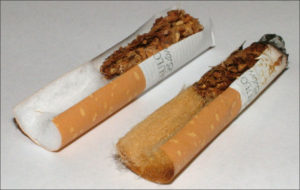The truth is, nobody knows for sure how long cigarette butts will take to decompose. Because they contain plastic, they will not biodegrade in the same way as organic material. Instead, they break into smaller and smaller pieces, eventually being classed as microplastics.
It has been estimated that cigarette filters will take between 500 and 1000 years to decompose, but there is not enough scientific evidence to give a conclusive answer to this question.
The scale of the problem
Cigarette butts are the most common form of litter in the world. And it’s not hard to see why: up until relatively recently, dropping cigarette ends was seen as a socially acceptable thing to do.
Amazingly, a survey by Keep America Beautiful found that 77% of Americans do not think of cigarette butts as litter.
This perception might be starting to fade, but our streets, countryside and beaches are still strewn with cigarette waste.
In fact, an estimated 4.5 trillion cigarette filters are littered each year worldwide. Collected together, they would weigh about as much as 150,000 elephants!
Do cigarette butts contain plastic?

Cigarette filters are made from a plastic called cellulose acetate. It’s the same type of plastic that is used to make sunglasses, textiles, photographic film, certain personal hygiene products, and much more.
Contrary to popular belief, there is no evidence that cigarette filters make smoking any less harmful.
Studies in the 1950’s were beginning to show just how dangerous smoking is for human health. To combat this, the cigarette companies introduced the filter in an effort to make cigarettes appear safer.
If you’ve ever smoked cigarettes, you might have noticed that once smoked, the cigarette filter will be discoloured. It looks as though it has collected a lot of the harmful gunk that may have otherwise ended up in your body. This, however, was a cynical ploy by the cigarette industry. It turns out that altering the pH level of cellulose acetate will change the color of the filter when they are smoked. It is a simple chemical reaction, rather than any actual safety feature.
How does plastic decompose?

Plastics do not biodegrade. The bacteria that cause organic materials to decay do not see plastic as food, and therefore just ignore it.
Instead, plastic undergoes a process called ‘photodegradation’. When exposed to sunlight, plastic becomes brittle and begins to break apart. The plastic will break into smaller and smaller pieces.
Once these pieces of plastic are measured at 5mm or under, they are classed as microplastics.
But do they ever truly go away?
The truth is, nobody really knows how long plastic takes to decay. Plastic has only been around for a relatively short period of time, so there is no first-hand evidence of plastic decay.
Estimates of how long plastic takes to decay range from 500 years to 1000 years.
But there have been no scientific studies that conclusively prove these estimates to be true. So, for the time being, they remain just that: estimates.
What problems do they cause?
Marine Life
During heavy rain, cigarette butts are carried down drains and through stormwater pipes, ending up in harbours, rivers, beaches and oceans.
Birds and other marine life can mistake cigarette butts for food, resulting in digestive problems, and sometimes death.
Cigarette butts have been found inside the stomachs of a variety of birds, turtles, and other marine animals.
Another risk comes from the fact that cigarette butts can contain toxic chemicals such as lead and cadmium. When the cigarette butt makes contact with the water, these chemicals begin to leak into the surrounding water, causing harm to nearby marine life.
A study conducted by San Diego State University found that one used cigarette butt in a single litre of water can kill both marine and freshwater fish. It is unclear, however, the effect these chemicals are having on our seas and oceans.
Forest Fires
The careless discarding of cigarette butts is one of the most common causes of forest fires.
In France in 2017, a cigarette butt was thought to be the cause of a massive forest fire that destroyed 800 hectares of land. 800 firefighters worked to tackle the fire, which caused widespread damage to farms and buildings.
It’s frightening how quickly a discarded lit cigarette butt can start a fire. Watch the following video for a demonstration:
